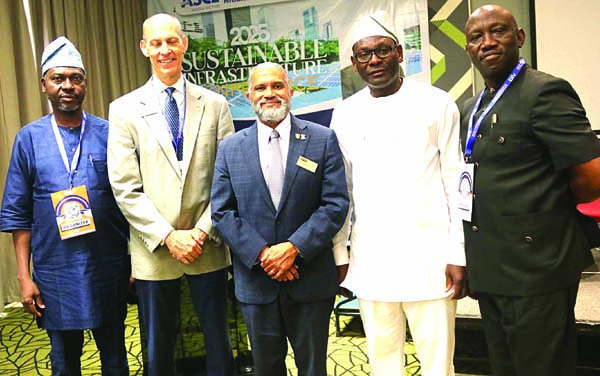Considering the role of sustainable infrastructure globally, The American Society of Civil Engineers Nigeria International Section, (ASCE) its stakeholders, gathered at the 2025 sustainable infrastructure conference organised by ASCE in Lagos, to discuss ways developing countries of African especially Nigeria can align its policies towards sustainable infrastructure for national development.
On the theme: “Integrated Approaches To Sustainable Infrastructure, Planning and Delivery”, President, ASCE Nigeria Section, Engr. Austin Odibi, said, “We are especially proud to host this event at a time when the call for sustainable, inclusive, and integrated infrastructure systems has never been more urgent. As civil engineers, we are duty-bound to lead the conversation and the action required to deliver lasting solutions for our communities”.
According to him, this conference is not just a meeting, it is a mission. “It is an opportunity to chart a path forward that emphasizes collaboration, innovation, and resilience. Together, let us explore how integrated approaches can transform infrastructure delivery in Nigeria and align our efforts with global best practices”.
In addition, 2025 President, American Society of Civil Engineers, Dr. Feniosky Pena-Mora, said, “This conference provides a platform to share knowledge, foster collaboration, and explore practical strategies that can bridge the gap from theory to implementation, from aspirational frameworks to impactful outcomes.
He said further that the theme of the conference reflects an understanding that infrastructure cannot be viewed in isolation. “Roads, bridges, energy grids, water systems, and buildings must be planned not only as individual projects but as interconnected components of broader social, environmental, and economic systems. So, sustainability, resilience, and cost-effectiveness are not competing priorities. They are interdependent goals. And integrated thinking across sectors, disciplines, and stakeholders is the key to achieving them together”.
However, on a shared responsibility Feniosky said, “It is our collective mission as civil engineers is to protect public health, safety, and welfare. That mission grows more complex in a world where extreme weather events, population shifts, and supply chain disruptions are increasingly the norm. It demands not only technical expertise but also ethical clarity, community engagement, and systems-level leadership”.
In the same vein, the CEO, Infrastructure Concession Regulatory Commission, Dr. Jobson O. Ewalefoh in his keynote address said, the theme, Integrated Approaches To Sustainable Infrastructure, Planning and Delivery, is both strategic and imperative.
“Around the world, and indeed across Africa, there is a pressing realization that fragmented, short-term approaches to infrastructure delivery are no longer viable. We are in an era where sustainable development is not a luxury, but a necessity. The call for integration speaks not only to the coordination of sectors, but also to the harmonization of ideas, policies, financing strategies, environmental imperatives, and the realities of our local contexts”.
Continuing, Dr. Owalefoh said, “For Nigeria and many developing economies, infrastructure remains the backbone of economic transformation. However, the gaps are wide and require urgent and integrated approach to bridge them. Infrastructure in some key sectors such as Energy, Transport, Agriculture, Water, Mining, Housing, Health care, Education, etc. have remained largely underdeveloped over the years. This led the Federal Government of Nigeria through the Ministry of Budget and National Planning, to collaborate with key stakeholders and develop the National Integrated Infrastructure Master Plan (NIIMP) in 2013, a 30-year ambitious programme to raise Nigeria’s infrastructure stock to GDP to the global benchmark of 70 percent from less than 25 percent, with a capital requirement of USD 3 Trillion. This masterplan was revised in 2020 to 23 years, with a capital requirement of USD 2.3 trillion. Both were benchmarked to end in 2043, and a review shows that the NIIMP translates to an annual average requirement of USD 100 Billion over the projected period. Clearly, our current budgetary allocations are insufficient to meet this demand”.
He said, “To bridge this financing gap, Nigeria, like many other nations, has embraced Public-Private Partnerships (PPPs) as a pragmatic alternative procurement model for public infrastructure and service delivery. However, these PPPs must be more than just financing instruments – in addition, they must become platforms for sustainable national development”.


